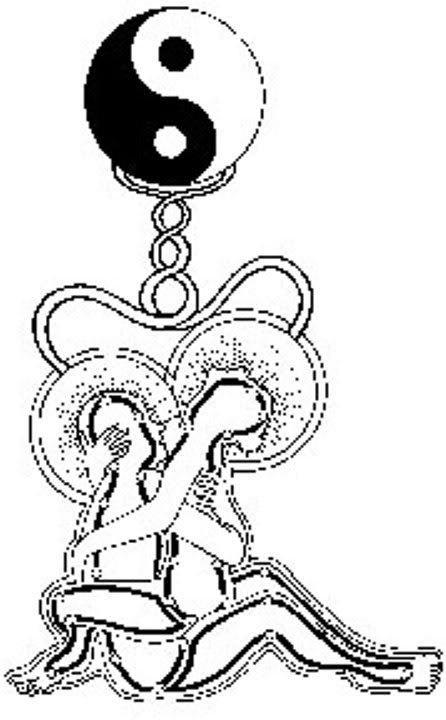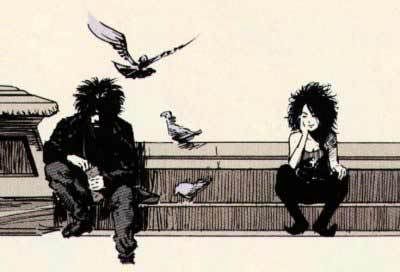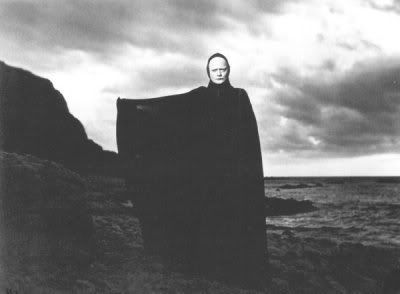The Girl in the Eye of the Storm
On Sunday, May 25th, Venus left her cozy dignity in Taurus, and set off into the wild winds of Gemini.

Like the goddess of her namesake, Venus' area of interest is in finding and reveling in pleasurable sensations. The movement of Venus into a new sign will also denote a shift in the overall demeanor of comely young women worldwide.
In Taurus, finding ways to please Venus doesn't take a lot of imagination – delicious food, a nice massage, a kiss. Its approach to pleasure is basic, tactile. This makes it very easy for Venus to operate here, where she deals with what is comfortable, stable, and physically pleasant. The Venus in Taurus woman is one who is desirable in an obvious but substantial way, and one whose desires are sated by the same method. She is a lovely young woman who is laid-back and easy to talk to, and she wants a piece of cheesecake.
Where Taurus' concerns center around life's bare necessities (food, shelter, sexual gratification, routine,) Gemini, ruled by Mercury, is all about intellect, versatility, easy acumen, and the schism of personality which can result in a polarization of values and (sometimes) mental instability. When the light of Venus is shined through this particular filter, the result is an aggressively brainy young woman, a "thinking man's sex kitten," who is likely more interested in chess than in cheesecake.

There is a suprising/disturbing amount of pornography devoted to this one.
Here, some distinctions should be drawn. Libra, Gemini's Cardinal Air cousin, is the other dignity of Venus. Like Venus in Gemini, Venus in Libra seduces and is seduced by what she finds interesting and intellectually pleasurable. However, Libra's penchant for balance and openness to new experiences leaves it in a much easier position to flirt and charm. Venus in Libra is a coquette who seduces through BEING an interesting and pleasurable experience, a person who everyone wants to know and talk to. For Gemini, however, polarization is fundamental, and Venus here may naturally divide a camp of potential friends into those who love her and those who cannot stand her. She's a debater, not an appeaser. She's got too much internal strife to keep it out of her interactions with others. However, her mutable nature and curiosity for a vast array of social interactions can also make her a bit of a chameleon, someone who can drift between very different cliques with no large effort. Just as the messenger god, Mercury, can travel anywhere and be welcome, Venus in Gemini can make friends anywhere.

Sexy Stolen Sandals
Being that Gemini falls under Mercury's rulership, I tend to think of the myth of Mercury's seduction of Venus when considering the mindset of Venus in Gemini. The myth goes a little something like this:
"Mercurius [Hermes] stirred by Venus's [Aphrodite's] beauty, fell in love with her, and when she permitted no favours, became greatly downcast, as if in disgrace. Jove [Zeus] pitied him, and when Venus [Aphrodite] was bathing in the river Achelous he sent and eagle to take her sandal to Amythaonia of the Egyptians and give it to Mercurius [Hermes]. Venus [Aphrodite], in seeking for it, came to him who loved her, and so he, on attaining his desire, as a reward put the eagle in the sky [as the constellation Aquilla]." - Hyginus, Astronomica 2.16

Gemini is represented by the twins, one being the divine/light twin, and the other being the mortal/dark twin. The two are utterly opposite in terms of principles, method, and manner, which in inconvenient in that they are irreversibly bound together in whatever planet is taking up residence in Gemini. Therefore, a lot of what Venus in Gemini is drawn to deals with that which seems either opposite or combatant. It is interesting to note that in the above myth, Mercury couldn't get the time of day until he took on an adversarial nature, thus becoming that "other" that Venus was interested in and drawn toward. It is also interesting to note that he was unsuccessful until he separated Venus from something that belonged to her, perhaps another nod to a sense of internal division and Venus in Gemini's need to reconcile the difference through combination of opposites. (Incidentally, their child is the androgynous god Hermaphroditus, whose name is the basis for the word "hermaphrodite," a very real example of this union of opposite forces.)
Solve for (Se) x
This myth plays itself out (minus hermaphrodite children) in David Auburn's play Proof, winner of the 2001 Tony and Pulitzer Prize, which was later adapted into a film starring Gwyneth Paltrow, Jake Gyllenhaal and Anthony Hopkins.

The play centers around Catherine, the daughter of a great mathematical genius who has just passed away. Shortly before the funeral, Hal, one of her father's best students, comes to their home to survey some of her father's final notes in the slight hope that he had discovered something important in a rare moment of clarity. Her father, Robert, had made revolutionary discoveries in his field very young in life, though his last twenty years had been an on-and-off battle with mental illness. Catherine acted as her father's caretaker towards the end of his life, at the expense of her own education and ambition.
Catherine is put off by Hal's intrusion of her space during a time of grieving, and accuses him of attempting to steal her father's work. A forced search of his backpack proves otherwise. She is apologetic and embarrassed by the hasty accusation, but as Hal tries to exit, a single notebook falls from under his jacket. Catherine, obviously enraged, calls the police. Hal tells her that he only meant to take it so that he could make it a present to her, as it contains praise and complimentary statements about her from her father's own hand.
Catherine's sister, Claire, turns up for the funeral. Claire is married, living in New York, has a sensible job, and is a bit of a yuppie. She presents a "light twin" opposite to Catherine, who is a disheveled Chicago resident with no career plans, having invested so much of herself into caring for her father. Though it was once implied that Catherine had inherited her father's brilliant mind, Claire also seems to believe that she has inherited his mental instability, and makes efforts to try and take control of Catherine's life.
Catherine and Hal end up seeing more of each other during and after her father's funeral. His good-natured, nerdy charm ends up winning her over, and the two end up sleeping together.
The crux of the play comes on the morning after, when Hal finds an amazing new theory among her father's papers, a long-awaited proof of a famous conjecture about prime numbers. His excitement is short-lived, as Catherine informs him that it was not her father's proof at all, and that she had written it herself. The question of her mental health and her lack of formal education make her statement hard to swallow for both Hal and Claire, especially given that her handwriting bears an uncanny resemblance to her father's. Catherine, meanwhile, has no way to prove (get it, "Proof?") that the theory is her own work. The rest of the play revolves around this issue, and the rift that has been driven between Hal and Catherine, who is hurt and shaken by his lack of trust in her intellect and stability.
Just as Hermes stole a shoe for a good cause, Hal also charmed Catherine by attempting to separate her from something that she was closely guarding – her father and his work were something that she came to consider a part of her being.
We also have a repeated theme of the classic Gemini "light twin/dark twin" theme. Catherine, with no credentials, questionable sanity, and aggressive demeanor, represents the dark twin in each scenario. While Claire certainly represents one aspect of polarization, Hal himself is another polarizing element to Catherine. Being a student of her father, he takes aspects of being one of his children, especially given that they both learned higher mathematics at his knee. There is an undercurrent of resent on both ends – for Catherine, she would have liked to have studied from her father in a formal, academic setting. For Hal, he would have liked to have known is teacher better as a man and a father figure. This twin effect in romance sounds kind of gross at first, but it makes a lot of sense given Gemini's allocation to The Lovers card in the Tarot.

Through Catherine, we can see that Venus in Gemini takes pride in expressing the contents of its mind, and in being taken seriously about that matter. Though Hal is able to charm her by proving himself intelligent and trustworthy, he burns this bridge when he is unable to extend the same courtesy to her. He neither trusts in her sanity nor her ability, and that is not a pleasant feeling to Venus in Gemini.
Rival Suitors and Fast Women
Another staple of this Gemini-polarization theme, when applied to Venus, is that it can cause division in the lovers that Venus in Gemini seeks out.
This can mean a lot of things. It can lead to mutability of partners (they get around.) It can also mean diversity of partner – I have a good friend with Venus in Gemini natally, and every girl he ends up with is completely different; he doesn't have a type, and is curious about all types of women. The only real link between the women he finds himself with is that they are all rather intelligent.
Another thing that'll often happen, whether by design or by accident, is that Venus in Gemini will cause two or more suitors to fight over her. I've seen it unfold in real life, and it's pretty gross.
A fine example of this type of polarization occurs in Martin Scorsese's Oscar-winning film, The Departed. This adaption of the Hong Kong action-thriller Infernal Affairs is a dangerous game of rat-versus-rat. Leonardo DiCaprio plays a cop who goes undercover in the mob. Matt Damon plays a gangster who acts as a mole in the Boston Police Department. Over time, the two become aware that there is a leak in the system, and take action to try to flush one another out.
Vera Farmiga plays Dr. Madolyn Madden, a Boston PD psychiatrist. DiCaprio's character is her patient, and the two carry on sessions with an air of dangerous flirtation. Damon's character, meanwhile, is her fiancée. As the battle between the two unfolds, she finds herself torn between loyalty and duty, unable to do much but distribute information to more powerful men on behalf of each of her suitors.
Dr. Madden is an accredited, confident, conventionally beautiful young woman who finds herself in a tumultuous and potentially dangerous situation. As such, she represents a polarization within this article, as the next person we're going to talk about is Marla Singer.
Marla Singer is a character from Fight Club, a book by Chuck Palahniuk which was adapted into a film by Jim Uhls and director David Fincher. In the film, Marla is played by the lovely and charming Helena Bonham-Carter. The character herself, though quick-witted as any Gemini, is a dark and self-destructive figure who chain-smokes through life while doing a lot of things you're not supposed to do (early in the film, she steals laundry from a out of coin-operated dryer, walks across the street to a used clothing store, and sells it,) and saying a lot of things you're not supposed to say (post-coitus, she remarks, "I haven't been fucked like that since grade school."). She is what a person might call a "fast woman," which is funny given Gemini's penchant for speed and fast-thinking – the reason why many who have important natal stuff in Gemini take a liking to the accessible, mentally-stimulating addictions like caffeine and nicotine.

The sexy & venerable HBC as Marla
She is the earliest representation of the anarchistic theme which runs throughout the plot. The anarchy delivered later on in the film is of a broader, revolutionary nature. Marla's attitude represents a sort of personal anarchy; no one can tell her that she can't do something if she knows full well that she is able to do it. According the Oxford English dictionary, it is a ""Absence or non-recognition of authority and order in any given sphere." In this case, the terms "authority" and "order" extend to what is socially acceptable; when we are introduced to Marla, she is attending a number of support groups though she shares no affliction with any of the attendees. For example, she meets the protagonist while attending a support group for testicular cancer.
The unnamed narrator of Fight Club (Edward Norton in the film) doesn't have testicular cancer, either. Like Marla, he is a "tourist," attending these support group meetings though not suffering from any particular affliction. He merely goes there for the emotional release, and so that he might be allowed to cry with a group of other sad people. The one thing that he does suffer from is insomnia, and the group hugs and catharsis of tears help him to sleep at night. That is, until Marla shows up at all of the same support groups, and the parasitic nature of his actions are reflected back at him.
Now, Fight Club is kind of an archetyping lay-up – the best friend/worst enemy roles that the narrator and the character of Tyler Durden (played by Brad Pitt in the film) take toward each other while working toward a singular purpose; it's all overwhelmingly characteristic of Gemini's internal strife, especially given their disparate nature and appearance.

But Marla's intrusion into the support groups is also a textbook patten of Gemini interference. She is the same thing as the narrator, only she has no qualms about the possible immorality actions. She polarizes him and reflects his own dark nature. Her appearance is likely a catalyst for the events which unfold when the narrator's dark side begins to take over, and the titular fight club is assembled.
Being that Marla is in the center of the conflict between the narrator and Tyler Durden, she also shares the same function as our psychiatrist from The Departed. For Dr. Madden, however, the fact that her suitors are on opposite sides of a war is a bit incidental; they would be fighting with or without her. For the narrator and Tyler, Marla is at the heart of their conflict; she's the one who caused them to divide and fight one another. In the end, though they have both slept with her, their feelings toward her are also polarized. One is in love and seeks to protect her, and the other sees her as a threat that must be eliminated.
Talk Nerdy to Me
Venus is not particularly strong in Gemini. Neither is it particularly weak, but occasionally it does take a little work to get a Gemini-type girl to put the book down and own up to being Venus-y. Kind of like the hot girl from She's All That, where no one knows she's a hot girl until she takes off her glasses and puts on a dress. But for a guy who's into Venus in Gemini, the preference might be that the glasses stay on. I know I had a big crush on Lisa Loeb back in the day, and I have a bigger crush on Dorothy Parker nowadays. (Dorothy was actually a Leo with a career ruled by Jupiter in Gemini. But that's another story...)

Legal!
At current, we can see this type of Venus in Sol's spotlight, as she walks hand in hand with the Sun through the middle degrees of Gemini, in conjunction with retrograde Mercury. While Mercury retrogrades are fraught with communicative malfunction, they are also a time for reconsideration, reconciliation, and quiet reflection. As stated, Venus is not in its dignity in Gemini, but Mercury is, and Venus is be taking its cues off of that selfsame retrograde.
Now would be a be a time for society to open its eyes and take notice of all the hot little Hermione Grangers and Tina Feys of the world. At the same time, it is a time when those same ladies will stop giving favor to either the angel or the devil on their shoulders and start recognizing that both have important things to tell them. We may see some good girls getting their groove back and some bad girls turning better. I hope not too much better, though. The world needs Marla Singers.
Speaking of singers...

Delicious Lisa Loeb. Not pictured: music.







































